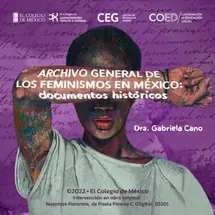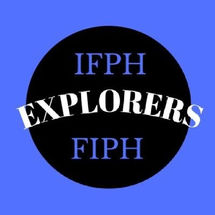CAMILA ORDORICA

Welcome!
I am a Mexican writer, archivist, and Ph.D. Candidate in History at the University of Texas at Austin, where I am also a CONTEX doctoral fellow. Inspired by Mexican history and the changes in information management in the digital world, in my work I explore the history of Mexico's General Archive.
My dissertation project tentatively titled Mexico’s House of Memory: The General Archive in the Long 19th Century, 1790 – 1910 is an exploratory history of this institution and its representation in history. Through an analysis of its material, social, and cultural conditions of development, my research delves into the fundamental questions of why modern nations need archives, how and who have assembled them, and how their objectives and accessibility have changed over time.

Why study archives?
The digital context
The revolution in digital communication technologies has transformed the methods of historical analysis and archival sciences alike. To study archival history is to address the history of information management technologies and of the communities that developed and applied them.
Access to information
Since 1948, the right to access information has been recognized as a fundamental human right, ensuring transparency in public affairs. Archives worldwide play a crucial role in upholding, implementing, and sometimes restricting this right. Studying their structures and history is thus an act of advocacy, reinforcing ideals of information access and data privacy.
Social justice
From a human rights standpoint, the access to archives is a fundamental characteristic for the implementation of transitional justice processes. Archives, as evidence of action, are sites where the past and contemporary global political struggles can be analyzed, questioned, and reframed.
Lack of scholarly attention
Critical archival scientists contend that historians since the 19th century have sexualized archives by portraying them as passive and feminized entities. This tradition led to a lack of historical attention to archives and archival practices, neglecting their active and assertive role in shaping the discipline of history and the State. Archival history challenges these assumptions, presenting archives as historic entities in their own right.

Writing
Here you can find the links to my published writing.
(In addition to academic writing, I also write essay and fiction which I hope to publish someday).
Peer-reviewed articles
Doscientos años del Archivo General y Público de la Nación: reflexiones sobre una herencia olvidada y cómo recordarla, Boletín del AGN, 2023
From Femicide to Feminicidio: Latin American Contributions to Feminist Conceptual History, Contributions to the History of Concepts 17, 2022
El caso del Archivo General de la Nación de México desde las páginas del Boletín Oficial, 1930- 2020, Revista de Historia de América núm. 163, 2022,
Short pieces
Bridging the Archival Divide. Lessons from ‘Archiving Activism Freedom School’, Not Even Past 2024
El archivo itinerante de Juárez, nexos, 2024
Hacia una historia del Archivo General de la Nación, nexos, 2023
Sobre los orígenes del concepto feminicidio, Letras Libres, 2023
La XVI Reunión Internacional de Historiadores de México en la Historia, Not Even Past, 2022
Conversations with Dr. Miruna Achim, Not Even Past, 2021
Impresiones de una enemiga interna en una embajada de México, nexos, 2020
Covidiario 14 de julio, nexos, 2020
Breve historia conceptual del feminicidio, nexos, 2019
La derecha autoritaria contra la libertad académica, nexos, 2018
Book reviews
One National Family: Texas, Mexico, and the Making of the Modern United States, 1820–1867. By Sarah K. M. Rodríguez. (Journal of the Early Republic Volume 45, Number 1, Spring 2025 The University of North Carolina Press)
La alhaja más preciosa. Historia de la Biblioteca de la Real Universidad de México by Manuel Suárez Rivera, (1761-1815), Historia Mexicana, 2025
Fifth Sun: A New History of the Aztecs by Camilla Townsend, Not Even Past, 2021
From Angel to Office Worker: Middle-Class Identity and Female Consciousness in Mexico, 1890-1950 by Susie S. Porter, Not Even Past, 2021
The Afterlives of Terror: Facing the Legacies of Mass Violence in Postrevolutionary France, by Ronen Steinberg in Not Even Past, 2021


CV
Access a full version of my CV here.
Education
2020 - Present
Ph.D. in History
University of Texas at Austin
2020 - Present
M.A. in History
University of Texas at Austin
2018 - 2019
M.A. in Gender Studies
Central European University
2013 - 2017
Bachelor's in History
Universidad Iberoamericana
CONTEX doctoral fellow
Comprehensive Exams (May 5, 2023): Exceptional Pass
Thesis: "The Eternal Belongs to Eternity: Ignacio Cubas and the National Archive (Mexico, 1823 – 1845)"
Awarded the Jan Carleton Perry Prize for best M.A. thesis in the History Department
Completed a specialization in Research Design in Women’s Studies with Distinction
Thesis: The Invention of a Concept for the Murder of Women: A Historical Study on the Development of Feminist Knowledge Production
Awarded “Academic Excellence Scholarship” for outstanding academic performance









